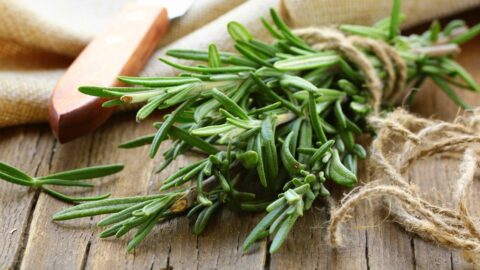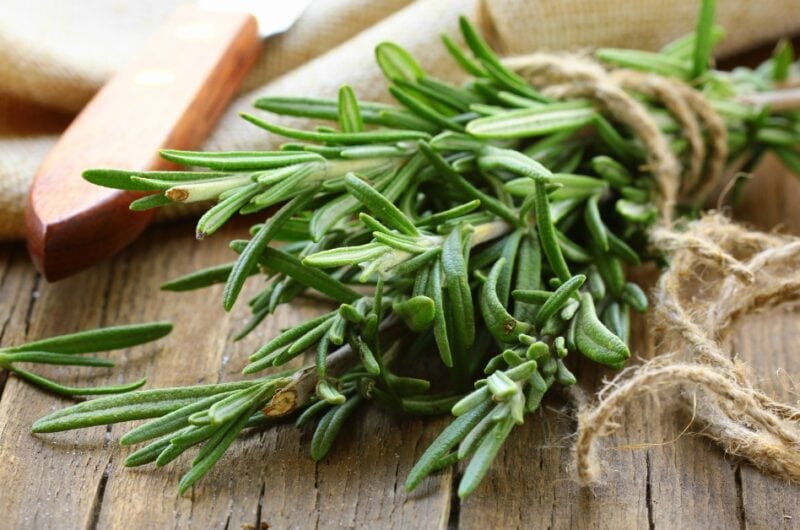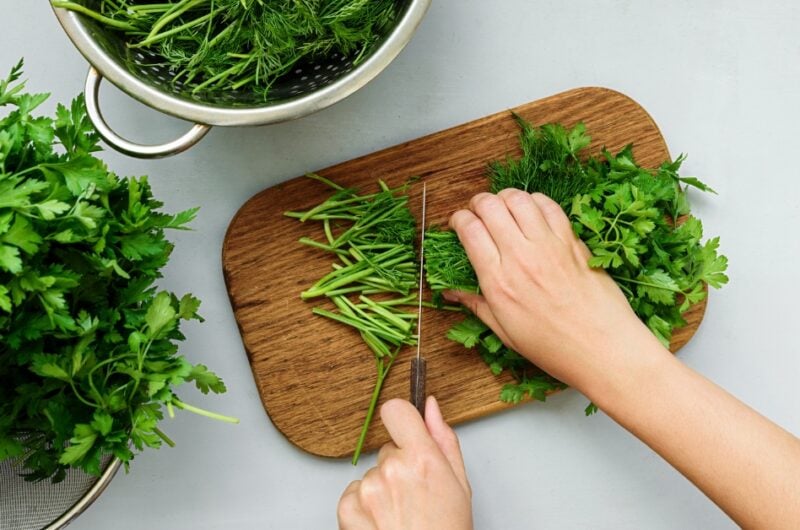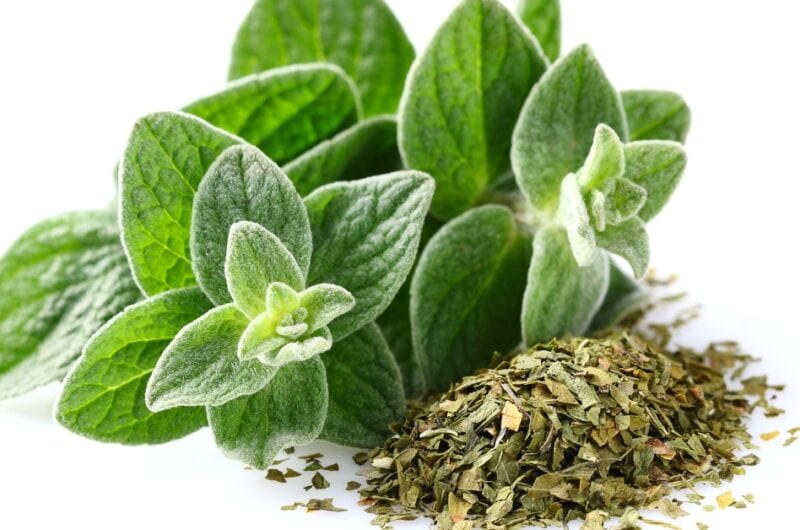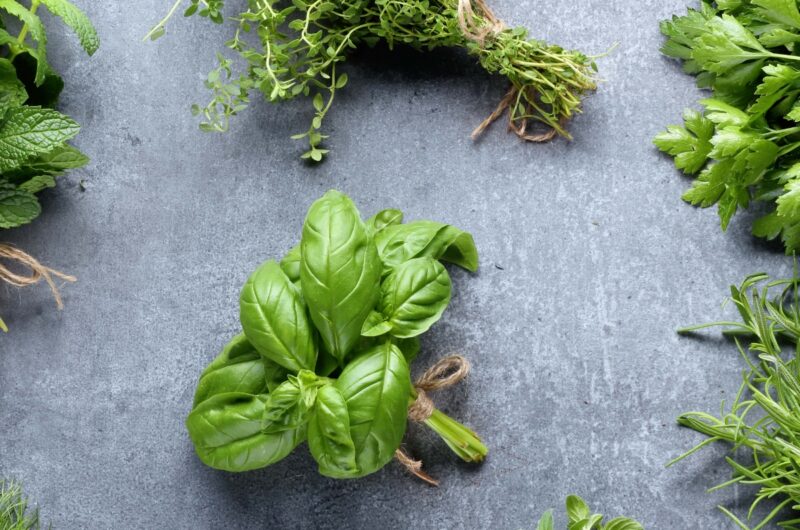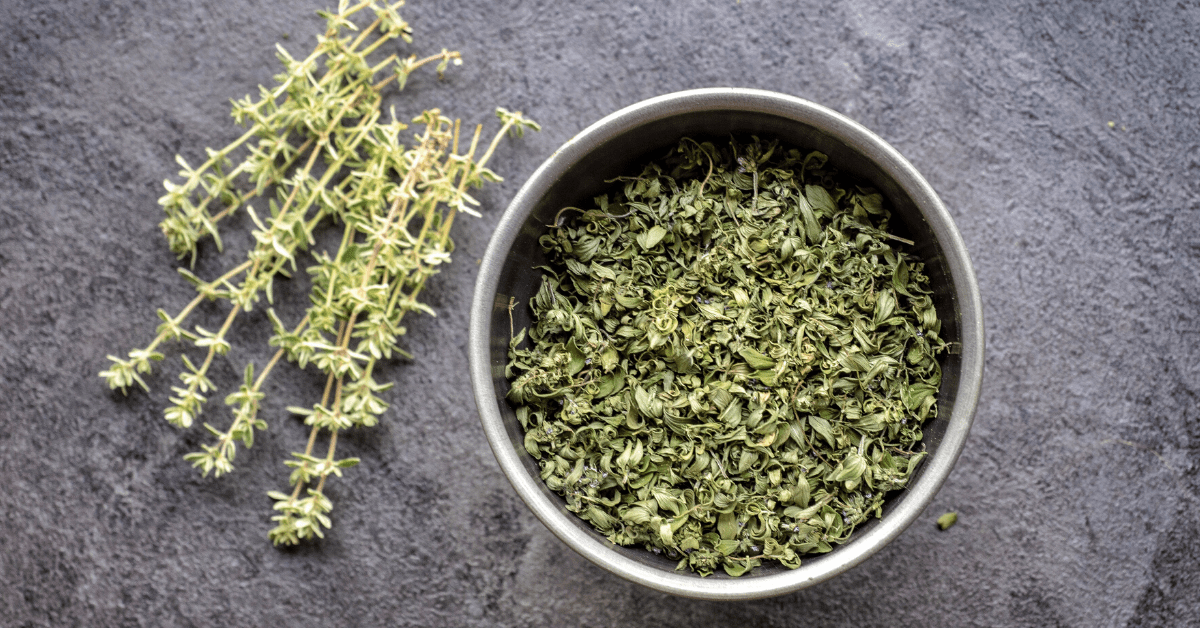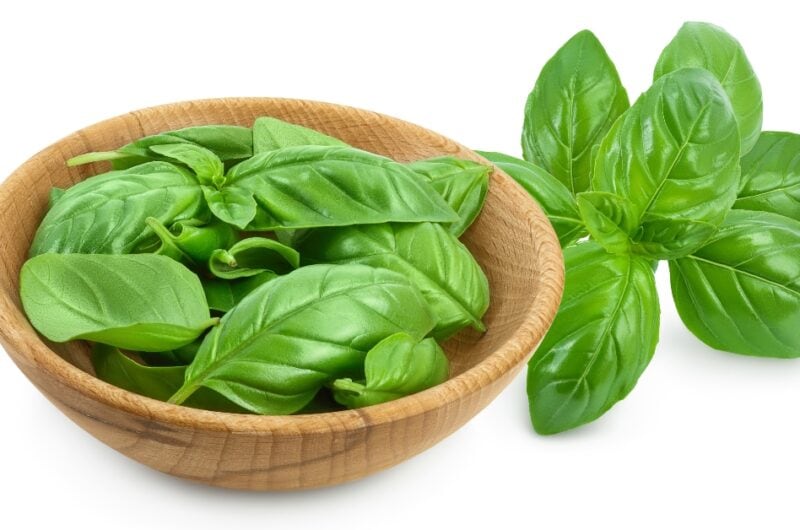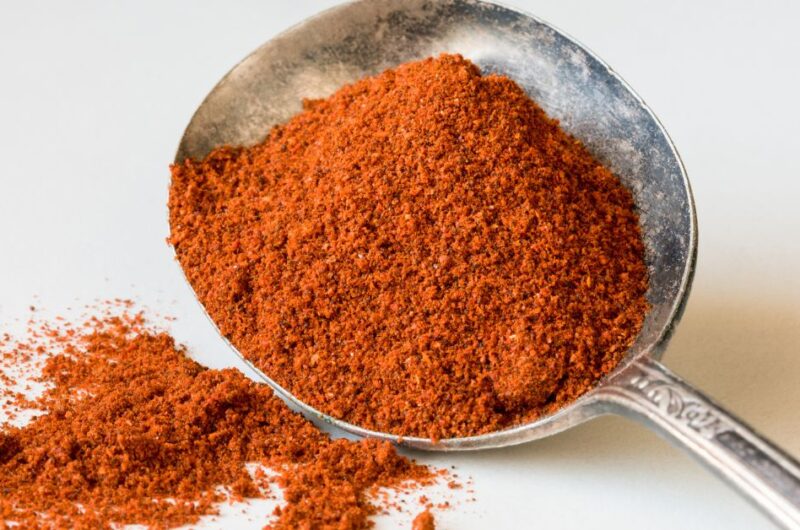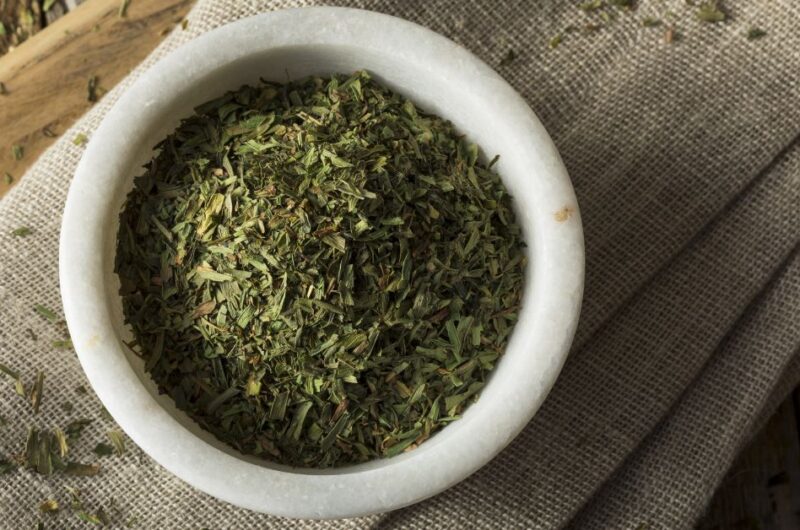


These substitutes for rosemary are a close second to the real deal. And they’re great in a pinch!
Rosemary is downright delicious. Its flavor is woodsy and aromatic, with notes of sage, mint, citrus, pine, and pepper.
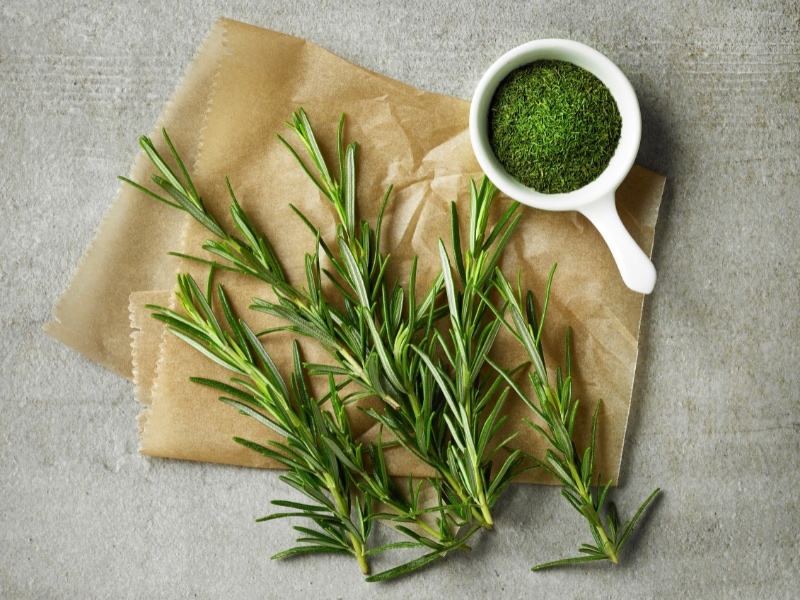
And since there are so many flavors within one little herb, it does a lot.
Chicken, fish, beef, veggies, rosemary tastes amazing with everything. Even desserts can benefit from it!
But if you don’t have any rosemary on hand, you can still make delicious food.
Keep reading for the best substitutes for rosemary.
How to Use Rosemary
Rosemary has a myriad of medicinal and beautification purposes.
It can help with things from memory performance to hair growth to boosting your focus.
And that’s just the tip of the iceberg.
But my favorite use for rosemary is its most obvious purpose, cooking.
Because rosemary is to deliciousness as King Midas is to gold. It adds flavor to everything it touches.
Now, you can use fresh rosemary or dried.
Dried rosemary has a more potent flavor than its fresher counterpart. But both add wonderful flavor to your dish.
Dried vs. Fresh Substitutions
You can substitute dried rosemary for fresh and vice versa.
Typically, you can substitute 1 teaspoon of dried rosemary for 1 tablespoon of fresh rosemary.
If your recipe calls for dried rosemary, but you only have fresh, you’ll use 1 tablespoon (3 teaspoons).
And generally, one sprig of fresh herbs equals about 1 teaspoon.
If you only need 1 teaspoon of fresh rosemary, use 1/4-1/3 teaspoons of dried rosemary.
NOTE: This fresh vs. dry substitution will work for all herbs.
The Best Substitutes for Rosemary
The best substitutes for rosemary come from herbs within the same plant family.
These include oregano, basil, and thyme. But there are a few others that work well, too.
The best choice also depends on what you’re cooking.
For example, certain herb combinations taste better with lamb than they would with chicken.
I’ve included a few examples of that below.
Except for a few multi-herb combinations, you can substitute all options in a 1:1 ratio.
- 1 tablespoon of fresh rosemary = 1 tablespoon of fresh oregano.
- 1 teaspoon of dried rosemary= 1 teaspoon of dried oregano.
Let’s dive in!

1. Oregano
Think of oregano as the slightly cynical older sibling of rosemary. It’s related, so it works well as a substitute.
Oregano has a very earthy flavor with notes of hay and mint. It’s also just a little bit on the spicier side.
Oregano is a fabulous choice for rosemary because of the way it imparts flavor.
Also, it has some fantastic health benefits like improving digestion and fighting viruses.
Substitution Ratio: Substitute an equal portion of dried oregano for dried rosemary.
Substitute an equal portion of fresh oregano for fresh rosemary. (1:1)

2. Basil
I love basil! In general, it’s one of my favorite herbs. But I do really enjoy it as a substitute for rosemary.
Basil is also part of the same plant family as rosemary, oregano, and thyme.
So, it makes sense to use it as a substitute because of its similar flavors.
Basil is a little sweeter than rosemary. It tastes a bit like mint, pepper, and anise. It’s not quite as earthy as rosemary.
It adds a bit more freshness to your dish.
Substitution Ratio: Substitute an equal portion of dried basil for dried rosemary.
Substitute an equal portion of fresh basil for fresh rosemary. (1:1)

3. Thyme
With its earthy, minty, and citrusy flavor notes, thyme is a fantastic substitute for rosemary.
It’s not quite as piney or peppery as rosemary. So, it’s a little more subtle.
Luckily, thyme is very versatile. So, it works with most of the same dishes as rosemary.
I particularly like it with chicken and potatoes.
Substitution Ratio: Substitute an equal portion of dried thyme for dried rosemary.
Substitute an equal portion of fresh thyme for fresh rosemary. (1:1)
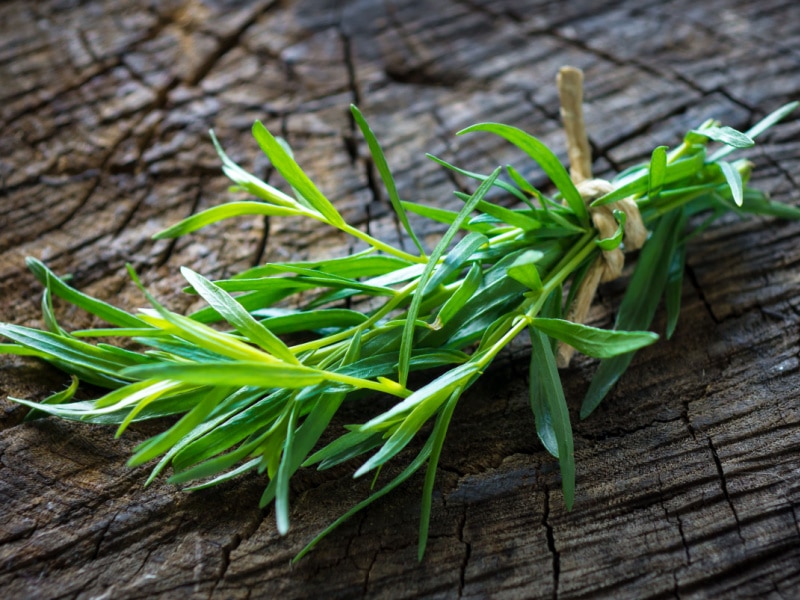
4. Tarragon
If you like licorice, you’ll love tarragon. It has a slightly bitter and very anise-forward flavor.
Its strong flavors make it a good choice to use in place of rosemary.
I think tarragon is best with fish or chicken dishes. But it is commonly found in a classic bechamel sauce.
Tarragon works really well in combination with marjoram and savory.
Substitution Ratio: Substitute a half portion of dried tarragon for dried rosemary.
Substitute a half portion of fresh tarragon for fresh rosemary. (1:2)
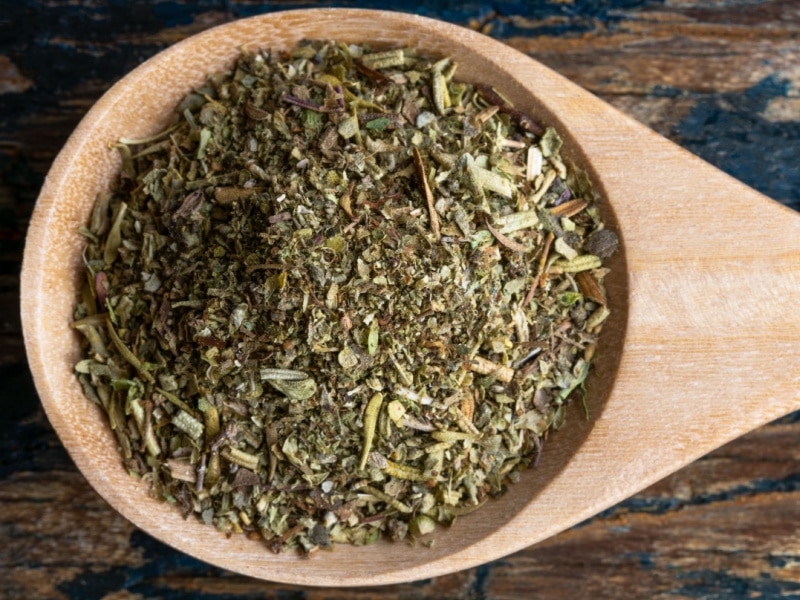
5. Italian Seasoning
Italian seasoning is a fantastic substitute for rosemary because Italian seasoning usually contains rosemary.
So really, you are using rosemary, plus a few other herbs and spices.
But even if your Italian seasoning blend doesn’t contain rosemary, it will work. Since it will typically contain basil and oregano. And we already know those are great subs.
Italian seasoning works best if your dish doesn’t require numerous other seasonings.
And obviously, it’s great for any Italian or Mediterranean-inspired dishes.
Substitution Ratio: Substitute a half portion of Italian seasoning for dried rosemary. (1:2)
Substitute 1 teaspoon of Italian seasoning with 1 tablespoon of fresh rosemary (1:3).
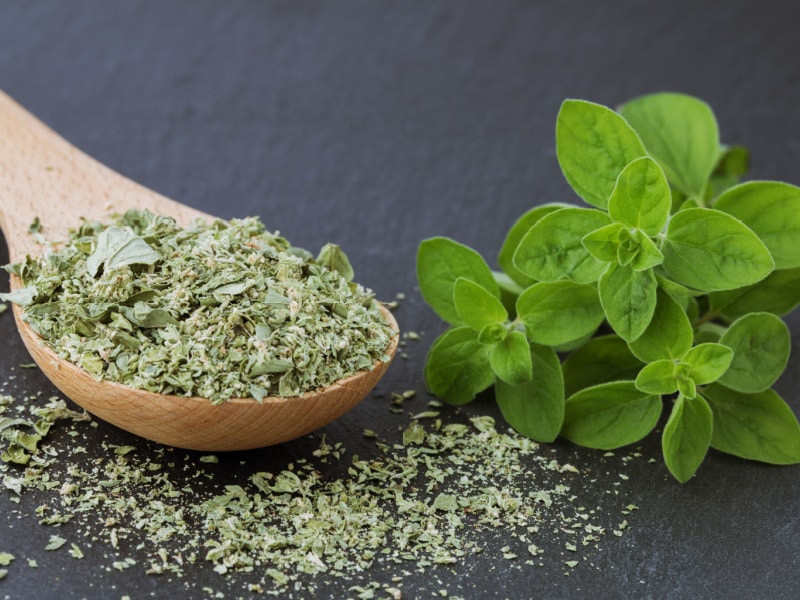
6. Marjoram
Marjoram is also related to rosemary and oregano.
Think of it as the sweet, little sister of the two. Marjoram has a complex flavor similar to oregano.
But it’s sweeter and more delicate. It’s also not as spicy as oregano can be.
Substitution Ratio: Substitute an equal portion of dried marjoram for dried rosemary.
Substitute an equal portion of fresh marjoram for fresh rosemary. (1:1)
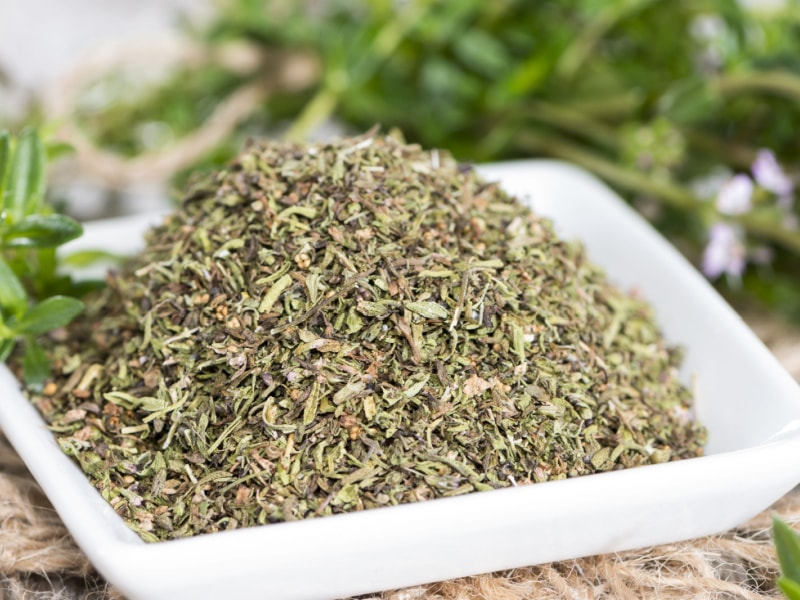
7. Dried Savory
Also known as the herb of love, savory has a delicious peppery taste.
Ancient Romans used it as an aphrodisiac. I’m not sure if it works that way.
But I know that it will add a little flavor-love to your dish.
It’s more common to find dried savory than fresh. That’s why I chose specifically to discuss dried savory.
However, you can use fresh if you have it on hand, in a 1:1 ratio.
Substitution Ratio: Substitute an equal portion of dried savory for dried rosemary. (1:1)
Substitute 1 teaspoon dried savory for 1 tablespoon fresh rosemary (1:3).
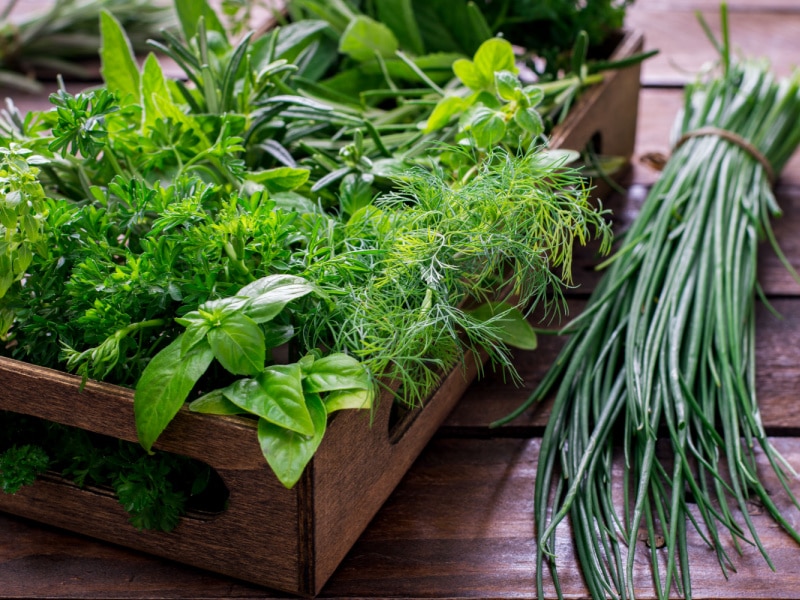
8. Dill, Parsley, or Chives- For Fish
All three of these delicious herbs work with fish, no matter the type. And they really highlight the natural flavor of the fish.
You can use one of these herbs or a combination of all three. I particularly like dill or the combo of the three.
Substitution Ratio: Substitute an equal portion of dried dill, parsley, or chives for dried rosemary.
Substitute an equal portion of fresh herbs for fresh rosemary. (1:1)
- If you want to use a combination, mix 1/3 portion of each of the herbs for every 1 portion of rosemary.
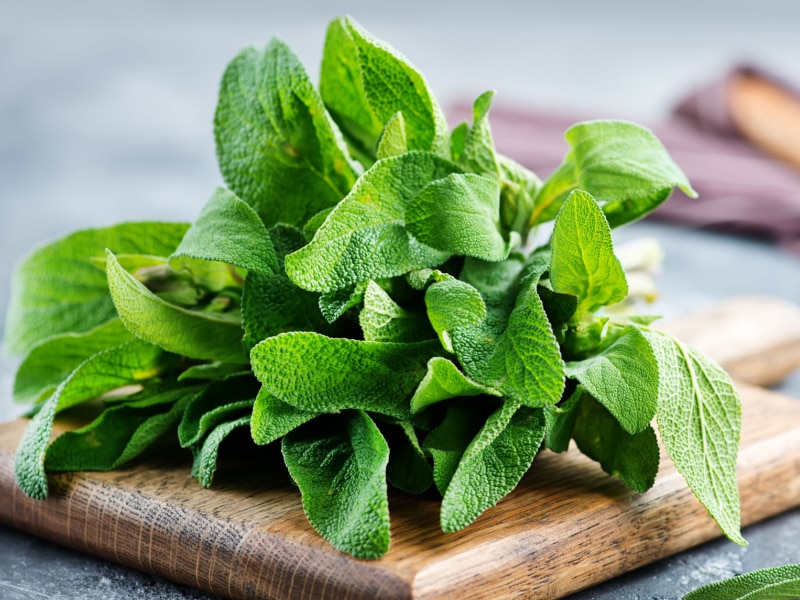
9. Sage- For Beef, Pork, and Eggs
Sage has a wonderful bright yet earthy flavor, with notes of eucalyptus, mint, and lemon.
It tastes stronger than rosemary, so you need less.
It complements the strong flavor of beef, pork, and eggs beautifully.
Substitution Ratio: Substitute a half portion of dried sage for dried rosemary.
Substitute a half portion of fresh sage for fresh rosemary. (1:2)
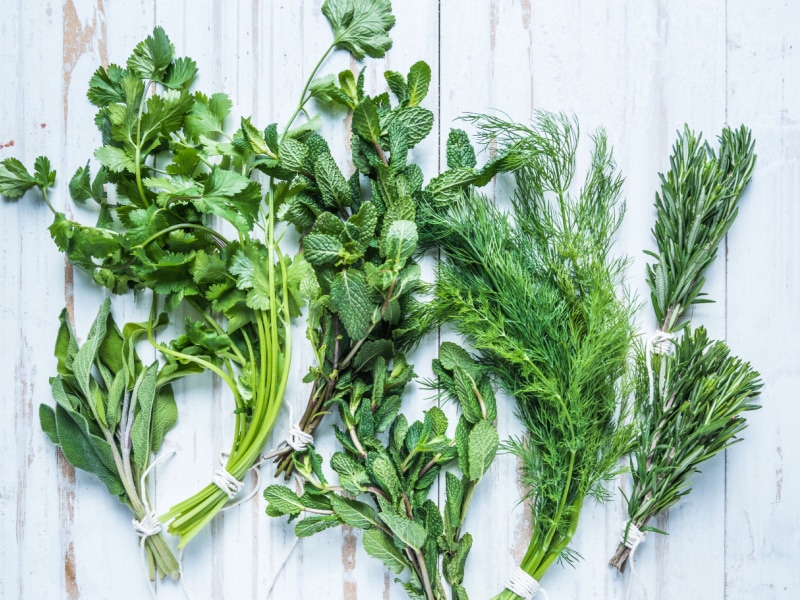
10. Bay Leaf, Peppermint, and Thyme- For Lamb
Lamb has a strong and distinct flavor, so it needs powerful herbs to complement it.
Substitution Ratio: Substitute 1/3 portion of each of the herbs for every 1 portion of rosemary.
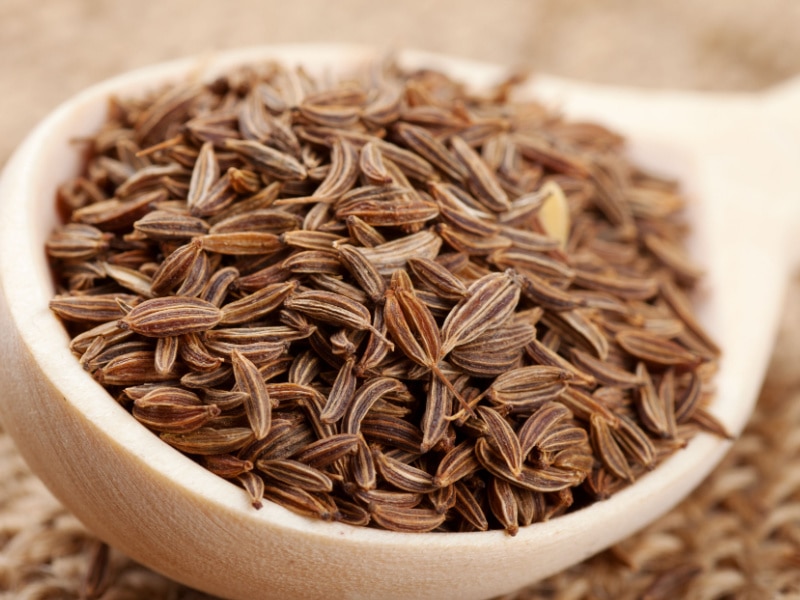
11. Caraway Seeds- For Sausage
Caraway seeds have a deliciously sharp and nutty flavor that pairs well with sausages.
Since sausages are already seasoned, caraway adds a little something-something without being overpowering.
Substitution Ratio: Substitute a half portion of caraway seeds for rosemary. (1:2)
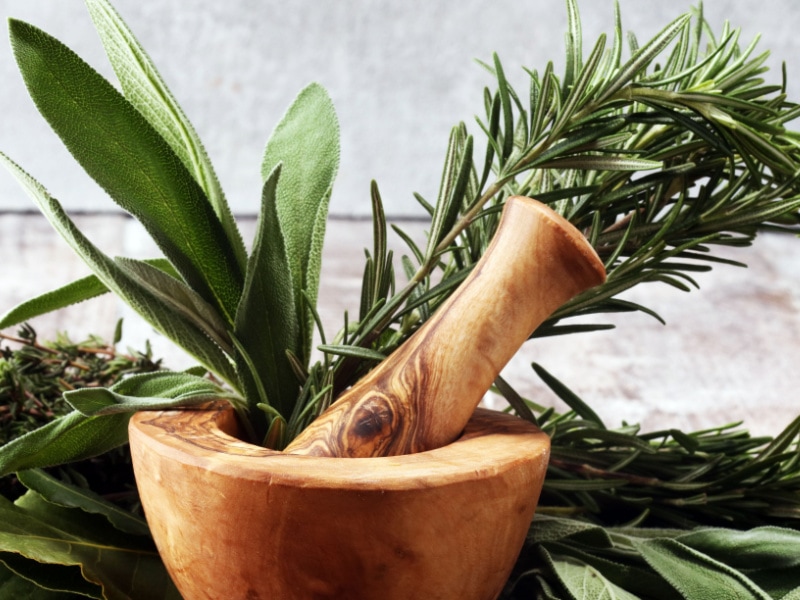
12. Sage or Thyme- For Poultry
Mix them together or use them separately. Either way, your chicken (turkey, etc.) will taste amazing!
Substitution Ratio: Substitute a half portion of sage for rosemary.
And substitute an equal portion of thyme for rosemary.
- If you want to do a mix, substitute 1/3 portion of sage + 2/3 portion of thyme for 1 portion of rosemary.
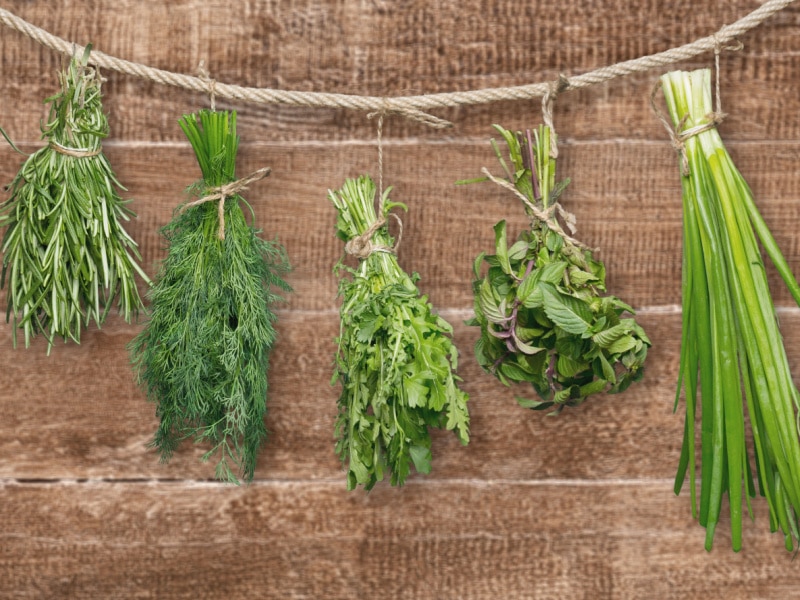
13. Marjoram, Chives, Dill, Parsley, Oregano, or Tarragon- For Mushrooms
Use one or use them all!
Substitution Ratio: Substitute an equal portion of herbs for rosemary. (1:1)
For any combo, divide 1 portion of rosemary equally between the herbs you chose.
13 Substitutes for Rosemary (Best Alternatives)
These substitutes for rosemary come in as a close second to the herb. From oregano to basil to thyme, all work well in your favorite recipes.
Ingredients
Oregano
Basil
Thyme
Tarragon
Italian Seasoning
Marjoram
Dried Savory
Dill, Parsley, or Chives- For Fish
Sage- For Beef, Pork, and Eggs
Bay Leaf, Peppermint, and Thyme- For Lamb
Caraway Seeds- For Sausage
Sage or Thyme- For Poultry
Marjoram, Chives, Dill, Parsley, Oregano, or Tarragon- For Mushrooms
Instructions
- Select your substitute for rosemary.
- Organize all the required ingredients.
- Prep a delicious recipe in 30 minutes or less!
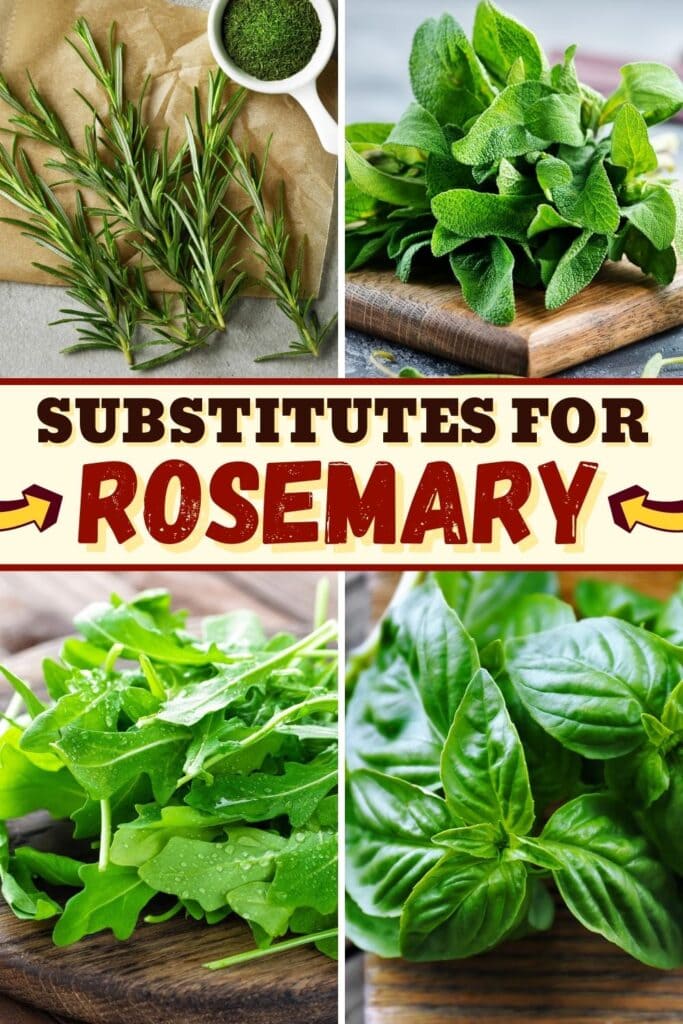
Did you like the recipe?
Click on a star to rate it!
Average rating 4.7 / 5. Vote count: 3
No votes so far! Be the first to rate this post.
We are sorry that this post was not useful for you!
Let us improve this post!
Tell us how we can improve this post?

